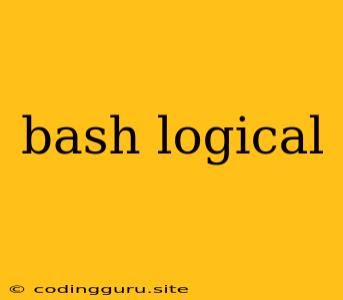Mastering Bash Logical Operators: A Comprehensive Guide
Bash, the default Unix shell, is a powerful tool for scripting and automating tasks. One of the key elements of Bash scripting is the use of logical operators. These operators help you control the flow of your scripts, enabling you to make decisions based on the outcome of commands and conditions. This guide will delve into the world of Bash logical operators, empowering you to write more sophisticated and effective scripts.
Understanding Logical Operators
Logical operators in Bash allow you to combine multiple conditions and evaluate their truth values. This lets you create complex logic within your scripts, making them more versatile and robust. Let's explore the most commonly used logical operators:
1. AND (&&): The AND operator returns true only if both conditions on either side of it are true.
Example:
if [ -f file1.txt ] && [ -s file1.txt ]; then
echo "File1 exists and is not empty."
fi
This script checks if a file named "file1.txt" exists and has content. If both conditions are met, it prints the message.
2. OR (||): The OR operator returns true if at least one condition on either side of it is true.
Example:
if [ -d /home/user/Downloads ] || [ -d /tmp ]; then
echo "Either Downloads directory or /tmp directory exists."
fi
This script checks if either the Downloads directory or the /tmp directory exists. If at least one of them exists, it prints the message.
3. NOT (!): The NOT operator reverses the truth value of a condition. If the condition is true, the NOT operator makes it false, and vice versa.
Example:
if ! [ -z "$variable" ]; then
echo "The variable is not empty."
fi
This script checks if the variable $variable is not empty. If it is not empty, it prints the message.
Real-World Applications of Bash Logical Operators
Logical operators have numerous practical applications in Bash scripting. Here are a few examples:
1. Checking File Conditions:
if [ -f file1.txt ] && [ -f file2.txt ]; then
# Process both files
...
elif [ -f file1.txt ]; then
# Process file1
...
elif [ -f file2.txt ]; then
# Process file2
...
else
echo "Neither file1.txt nor file2.txt exists."
fi
This script checks for the existence of two files, "file1.txt" and "file2.txt". It executes different actions based on the presence or absence of each file.
2. Conditional Command Execution:
command1 && command2 || command3
This command chain executes command2 only if command1 is successful. If command1 fails, command3 will be executed. This is useful for cascading commands with dependencies.
3. User Input Validation:
read -p "Enter your password: " password
if [ -z "$password" ] || [ ${#password} -lt 8 ]; then
echo "Password cannot be empty or less than 8 characters long."
else
# Process password
...
fi
This script validates user input for a password. It checks if the password is empty or less than 8 characters long. If either condition is true, an error message is displayed.
Tips for Efficient Use of Logical Operators
1. Parentheses for Clarity: Use parentheses to group expressions and improve readability, especially when dealing with multiple logical operators.
2. Short-Circuiting: Bash evaluates logical expressions from left to right. If a condition in an AND chain is false, the remaining conditions are not evaluated. Similarly, in an OR chain, if a condition is true, the remaining conditions are not evaluated.
3. Error Handling: Use logical operators to check for errors during command execution. For example:
if ! command; then
echo "Command failed!"
fi
Conclusion
Logical operators are an essential part of Bash scripting, allowing you to create complex decision-making logic within your scripts. By mastering these operators, you can write more efficient, robust, and versatile scripts that automate tasks effectively. Remember to use them strategically, leverage their short-circuiting behavior, and ensure proper error handling for robust scripting.
